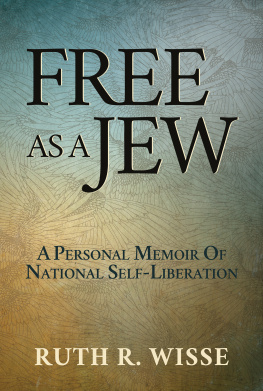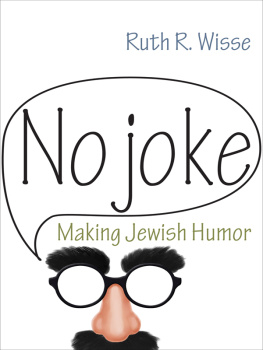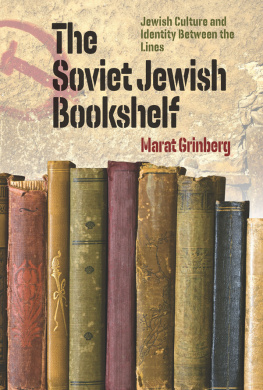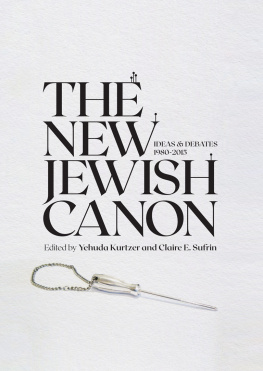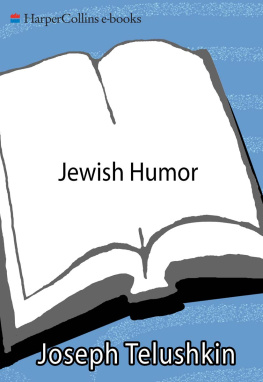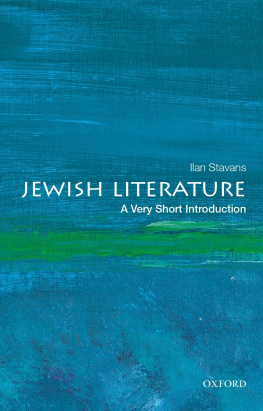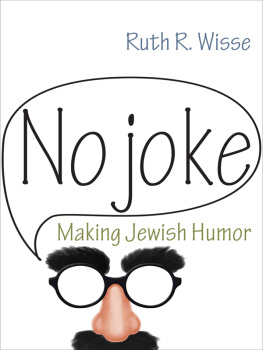PREFACE
I N THE LATE 1960S, during a period of general expansion in higher education, I won permission to introduce courses on Yiddish language and literature at McGill University, where I was then teaching sections of the English literature survey. A decade earlier, when I was an undergraduate at McGill, not a single course in any department offered instruction about the Jews. McGill of the 1950s was not unusual: there were then only three full-time positions in Jewish Studies in North AmericaHarry Wolfson at Harvard, Salo Baron at Columbia, and Walter Fischel at the University of California at Berkeley. In proposing to teach Jewish literature, I argued that an expanded humanities curriculum would broaden the universitys coverage of Western culture, legitimating the universitys claim to be teaching Western, rather than Christian, civilization. Since it may prove relevant to my discussion of the works presented in this book, I might as well relate that the only member of the English department who voted against my proposal was its only other Jew, an assistant professor of English who had recently arrived from New York City.
During my undergraduate years at McGill, I had not given much thought to the exclusion of Jewish culture from the curriculum. Nevertheless, it did seem strange to me that my introductory economics course overlooked the role of Jews in trade and talked about the Rothschilds without mentioning their Jewishness, and it was painful to read certain passages in Chaucer and Celine that libeled the Jews without being invited to discuss the authors prejudice. Although McGill had rescinded its discriminatory admissions policy in 1950 and Jews in large numbers were to be found on campus, our presence was never acknowledged, and I was occasionally troubled that the intellectual traditions and culture of the Jews went unmentioned. Mais sois gentille, my French teacher might have said had I raised the problem with her. Be grateful that you have been welcomed here despite your Jewishness, and dont expect to have your Jewishness included along with you. Why not take your place in this society as a Canadian and a Quebecer, speaking English and French and performing Shakespeare and Molire, to the point of becoming a teacher yourself should you be able to match your ability with your ambition? Why not, indeed?
But shortly after I graduated, I surprised myself rudely. The defining moment occurred during the first visit to Canada in 1959 of the Yiddish poet Abraham Sutzkever, whose speaking tour I had helped to organize. Survivor of the Vilna ghetto and witness on behalf of Russian Jewry at the Nuremberg trials, Sutzkever had become what Yiddish literary criticism calls more than a poethe had become a symbol of the creative Jewish spirit after the devastation of the Second World War. His lyrics, which I read in private and heard in his public readings before Yiddish audiences, moved me to arrange a reading of a selection of his poetry for Folkways Records.1 (I had already been introduced to Yiddish literature: it was taught in the Jewish day school I had attended, and more importantly, my parents adoration of Yiddish culture had brought many of the leading contemporary Yiddish writers and poets into our home.) One day, when Sutzkever asked me about my professional plans, I told him I was thinking of going to graduate school to take a degree in English literature. Why dont you study Yiddish? he asked. I laughed aloud. And what would I do? Teach Sholem Aleichem?2
Those words changed the course of my life. The insult to Sutzkever was not as great as the shock to myself: how could I have voiced such contempt for the tradition of literature in which I had been raised? Why mock the prospect of teaching Sholem Aleichem, one of my favorite writers? Along with the education I had received at college, the eclipse of Jewish subjects in the curriculum had apparently persuaded me that Jews had no viable cultureand this in violation of the culture that had produced me! A few days later I applied to the graduate program in English and Comparative Literature at Columbia University, the only place on the continent where Yiddish then formed part of a graduate degree program. And it was after I returned to McGill to complete my graduate education and had already begun teaching there that I petitioned for and received permission to add Yiddish language and literature to that universitys offerings. I hoped that the inclusion of Jewish studies in the university curriculum would allow Jews like me to do advanced study in their own sources and to invite everyone else to share in them, too.
The kind of inferiority consciousness I discovered in myself seems fairly typical of members of ethnic and religious minorities who begin to make their way into the mainstream of society. As long as we are fighting discrimination, our goal is to be treated fairly, but once we are treated fairly, we want the further respect that comes with being both tolerated and known. Once minority members feel sufficiently comfortable in the university, they want to incorporate their particular culture within the mainstream culture. At least, that is how it happens in democratic America, where immigrants are encouraged to become citizens, not squatters. When I tried to gain the right to include Jewish studies in the university curriculum, it never occurred to me that I might be challenging the notion of Western civilization: my conscious purpose was to strengthen that civilization by reincorporating the Jews into a framework from which they had been artificially excluded.
I even came to see the task as urgent. By the latter part of the twentieth century, no one could honestly study European philosophy or history, much less theology or politics, without tripping over the bones of the Jews. But North American society was different. It was not only an extension of Europe but also a reaction against Europe. I believed that an integrated American curriculum would reinforce an integrated society. This was more than a decade before Holocaust studies were offered at universities, and I believed then, as I still do, that it is important to teach Jewish civilization for its own sake and as a counterforce to anti-semitism and that, as a matter of priority, learning about the Jews is more important for the future of humankind than learning about their extinction.
Yiddish literature seemed the perfect vehicle for this intellectual reconciliation. The vernacular language of European Jewry, Yiddish probably developed about nine hundred years ago in the small Jewish communities along the banks of the Rhine and Moselle Rivers. It then matured as it spread with its speakers throughout the continent, from Amsterdam to Omsk, arriving eventually, with their descendants, in all the other continents.3 By 1939 there were about ten million Yiddish speakers in the world, more Jews than had ever simultaneously known a Jewish language at any time in history. Inspired by hopes of emancipation and challenged by the ideas of the Enlightenment, modern Jews had created a dynamic literature in Yiddish on a par with their European counterparts. Through the study of Yiddish poetry, fiction, and drama, I believed, students could absorb the nuanced inner experience of their writers, as opposed to the anti-semitic stereotypes found in much European writing. Given how much pleasure I had derived from learning about the British, the French, the Germans, and the Russians by reading some of their best-known authors, I wanted to provide the same experience for Jewish and non-Jewish students through the reading of Yiddish works, preferably in the original but also in translation. What especially appealed to me was the normalcy of this academic arrangement: other European nations had their vernaculars, the Jews had theirs; other European nations had their literatures, the Jews had theirs. I was intent on establishing an academic symmetry so that one could study in tandem what politics had forcibly kept apart. To this end, I patterned my Yiddish coursesthe Yiddish short story, the Yiddish novel in interwar Polandon courses I had taken in other departments, making due modifications for the special properties of the literature I was teaching.


